Are human rights adequately protected and promoted - Attorney ...
Are human rights adequately protected and promoted - Attorney ...
Are human rights adequately protected and promoted - Attorney ...
You also want an ePaper? Increase the reach of your titles
YUMPU automatically turns print PDFs into web optimized ePapers that Google loves.
• A federal system. In Australia there is a national government <strong>and</strong> six state <strong>and</strong><br />
two territory governments. The distribution of power between the different levels<br />
of government means that each can act as a check on the other.<br />
• Separation of powers. Under the Constitution power is distributed between the<br />
executive, legislative <strong>and</strong> judicial arms of government. The separation of powers<br />
doctrine does not operate in a strict fashion in Australia (given that the members<br />
of the executive sit in parliament) except in relation to the independence of the<br />
judiciary. This means the judiciary can act as a check on the executive <strong>and</strong> the<br />
legislature <strong>and</strong> thereby protect individual <strong>rights</strong>.<br />
• Responsible government. The doctrine of responsible government means that<br />
the executive is drawn from, <strong>and</strong> accountable to, parliament. Ministers are<br />
collectively responsible to parliament, <strong>and</strong> a government that loses the support<br />
of the House of Representatives must resign. Ministers are also individually<br />
responsible to parliament for the administration of their portfolios. 30<br />
• Bicameral parliaments. The Federal Parliament <strong>and</strong> all state parliaments except<br />
Queensl<strong>and</strong>’s are bicameral—meaning they have both an upper <strong>and</strong> a lower<br />
house. 31 Because of the different voting system for the upper house, that house<br />
can contain a majority of non-government members, as is usually the case with<br />
the Senate. This offers an additional check on the government’s power.<br />
• Parliamentary committees. Parliamentary committees—which are made up of<br />
members of one house of parliament or of both houses—can have a range of<br />
functions, including reviewing Bills <strong>and</strong> legislation for their impact on individual<br />
<strong>rights</strong>. For example, the Senate Scrutiny of Bills Committee is empowered to<br />
scrutinise Bills for their effect on fundamental <strong>rights</strong> <strong>and</strong> liberties. 32<br />
• A free press. The media is generally free to publish material that is critical of the<br />
government. This increases accountability <strong>and</strong> helps citizens make informed<br />
decisions at election time.<br />
The adequacy of democratic institutions<br />
Throughout the Consultation some members of the community said Australia’s<br />
network of democratic institutions is enough to protect <strong>human</strong> <strong>rights</strong>. 33 Many also<br />
recognised, however, that these institutions have limitations when it comes to the<br />
30 M Groves <strong>and</strong> HP Lee (eds), Australian Administrative Law: fundamentals, principles <strong>and</strong> doctrines (2007)<br />
4–5.<br />
31 The Northern Territory <strong>and</strong> the ACT have unicameral legislatures.<br />
32 See Senate Scrutiny of Bills Committee, St<strong>and</strong>ing Order 24.<br />
33 For example, R Dennis, Submission; A Beveridge, Submission; A Teale-Sinclair, Submission; A Grills,<br />
Submission; J <strong>and</strong> T Van Duyn, Submission.<br />
Rights <strong>and</strong> responsibilities in Australia | 105


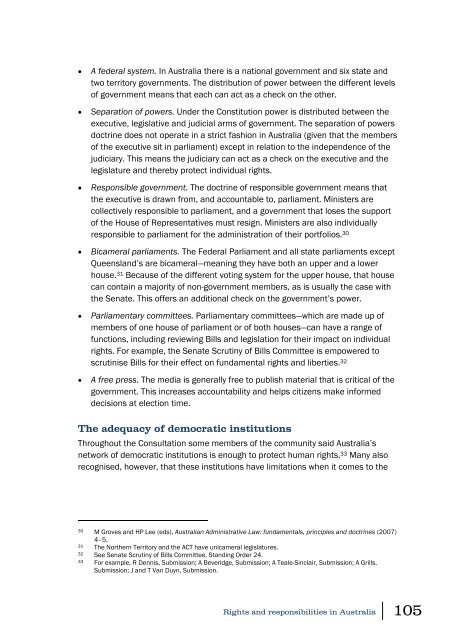

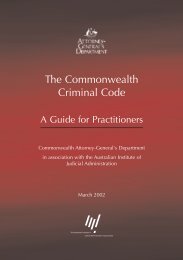
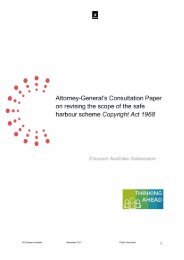

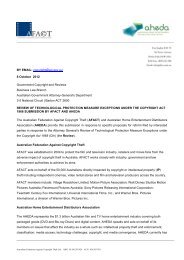

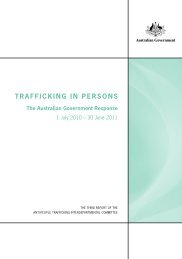
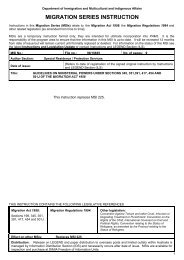
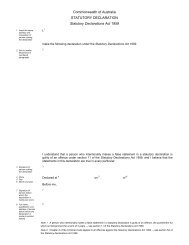

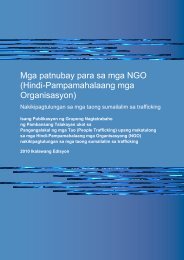
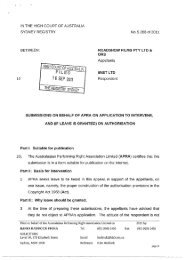
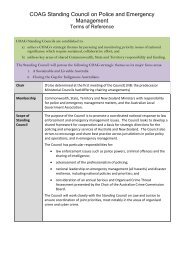

![Normann Witzleb [PDF 657KB] - Attorney-General's Department](https://img.yumpu.com/26247895/1/184x260/normann-witzleb-pdf-657kb-attorney-generals-department.jpg?quality=85)